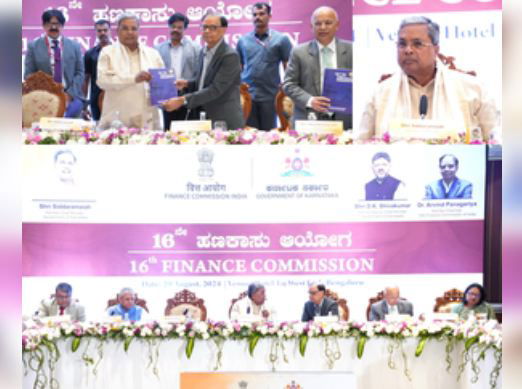Business
Advocate for balanced, fair approach to resource sharing, says K'taka CM to 16th Finance Commission

Bengaluru, Aug 29
Karnataka Chief Minister Siddaramaiah on Thursday said that seven crore Kannadigas look up to the Finance Commission to advocate for a balanced and fair approach to sharing of resources as reduction in Central financial transfers places "severe limitations on the state's ability to invest in physical and human infrastructure".
He was addressing the Chairman and Members of the 16th Finance Commission here.
“A strong Karnataka is crucial for a strong India. States with strong contributions to the country’s GDP and Gross Tax Revenue, help build the nation in more ways than one. Seven crore Kannadigas, while being proud of their contributions to the country, have aspirations. They look up to the Commission to advocate a balanced and fair approach to sharing of resources,” stated CM Siddaramaiah.
He said that due to the disproportionate weightage given to equity, Karnataka and similarly placed states end up getting penalised for their good performance, both fiscally and demographically. However, the reduction in Central financial transfers is placing severe limitations on the ability of the states to invest in physical and human infrastructure. This issue must be addressed urgently, CM Siddaramaiah appealed.
CM Siddaramaiah emphasized that the state also faces regional imbalances, especially in the Kalyana Karnataka region. The state faces the challenges of urbanisation. These require greater devolution by the Centre. Bengaluru needs an investment of Rs 55,586 crore over the next five years out of which we request for a grant of Rs 27,793 crore, he demanded.
"Similarly, for the equitable development of the Kalyana Karnataka region, the state is investing Rs 25,000 crore and requests a matching grant of Rs 25,000 crore over five years from the 16th Finance Commission. To ensure effective disaster mitigation and timely relief and rehabilitation measures in the highly vulnerable region of Western Ghats, we request a grant of Rs 10,000 crore, he stated.
“We trust that the Commission will address the vertical and horizontal imbalances keeping both equity and efficiency principles in mind. It is understandable that the Constitution provides for re-distribution of the tax proceeds among the states. The Finance Commission, however, need to carefully examine the impact of extremely high emphasis given to equity on the incentives of well-performing states...Moreover, the taxpayers of such states expect their taxes to work for them. This creates public trust. The Finance Commission therefore needs to do a tightrope walk while balancing equity with efficiency and performance,” he suggested.
"Karnataka has been central to India's growth story. It contributes approximately 8.4 per cent to the national GDP with only about 5 per cent of the population. The state ranks 2nd in total GST contribution to the country...Despite Karnataka's substantial contribution of about Rs 4 lakh crore to the Gross Tax Revenue of the Union every year, the state gets about Rs 45,000 crore in the form of devolution and about Rs 15,000 crore grant-in-aid. This means that for every rupee Karnataka contributes, only 15 paise is returned to the state," he pointed out.
The 15th Finance Commission’s award reduced Karnataka’s share sharply from 4.713 to 3.647. This has led to a loss of Rs 68,275 crore during the 5 years from 2021-26. The Finance Commission was conscious of the drastic cut Karnataka received and recommended state-specific grants of Rs11,495 crore. The Government of India, however, has not accepted the recommendation. So, Karnataka was deprived of these grants as well. The total of all the losses amounted to Rs 79,770 crore during the 15th Finance Commission period, CM Siddaramaiah maintained.
"Cesses and surcharges are not part of the divisible pool. Over the years the Union government has increased its reliance on cesses and surcharges. This has led to the divisible pool not growing in the same proportion as the Gross Tax Revenue. This has caused substantial loss to all the states. The loss to our state on account of the non-sharing of cesses and surcharges from the divisible pool is Rs 53,359 crore in 2017-18 to 2024-25...Despite such a reduction of Central transfers, Karnataka has kept its commitment to its flagship schemes such as the five guarantees. We have also not compromised on capital expenditure. Recognising the high multiplier effect of Capital expenditure, Karnataka has maintained its capital expenditure at 2 per cent of its GSDP since 2013-14. The state ranks number one in terms of capital expenditure," he stated.
"Economically advanced states are committed to supporting poorer states, but this should not come at the expense of their own residents or economic efficiency. A larger proportion of resources generated by the states should be shared with them," he emphasized.
Regarding the Horizontal and Vertical Devolution, the CM said he would request the commission to recommend that vertical Devolution should be at least 50 per cent of the divisible pool; the cesses and surcharges should be capped at 5 per cent of gross tax revenue; anything exceeding that should be a part of the divisible pool; all non-tax revenues of the Centre should be included in the divisible pool of taxes by bringing the necessary Constitutional amendment.
“We request the Commission to take a bold view and approach, whereby equity considerations are balanced with sufficient reward for efficiency and performance. Karnataka recommends that 60 per cent of the contribution of a state to the divisible pool, for inter se allocation among states, should be given to that state,” he appealed.
The 16th Finance Commission is holding a meeting with state government authorities in Bengaluru. Commisison Chairman, Dr Arvind Panagariya, and members -- Ajay Narayan Jha, Annie George Mathew, Dr Manoj Panda and Dr Soumya Kanti Ghosh -- were present in the meeting.



































